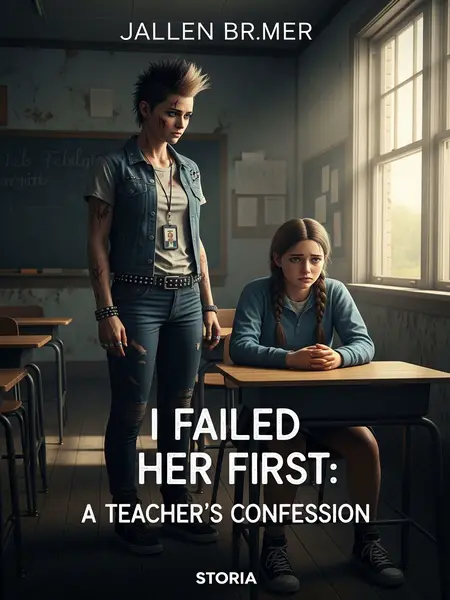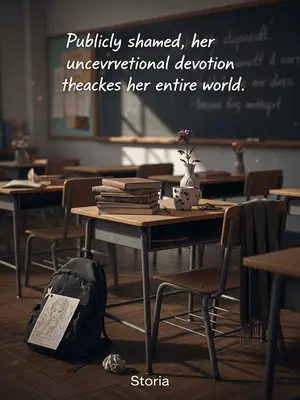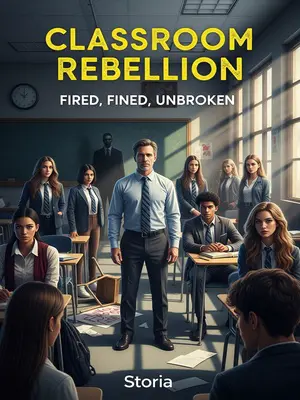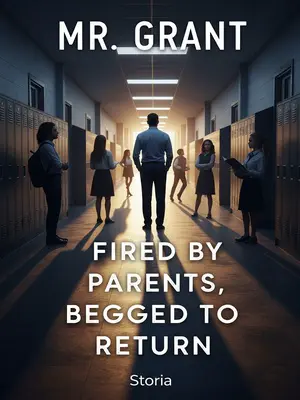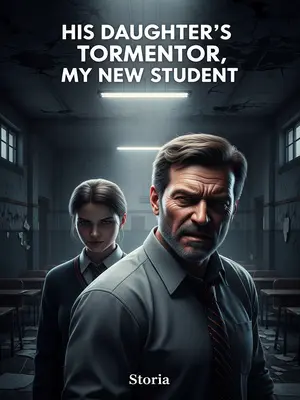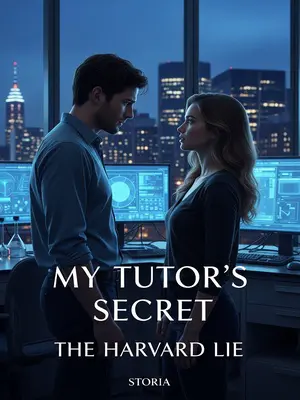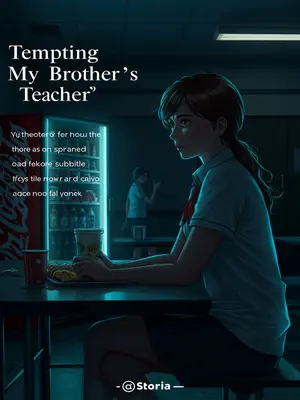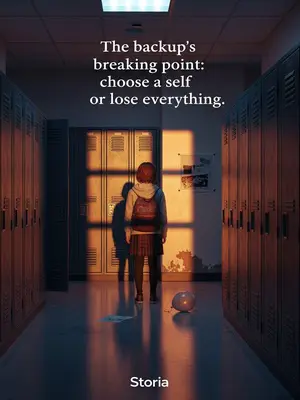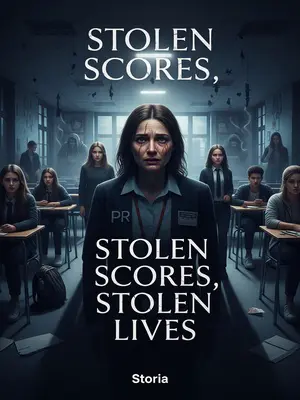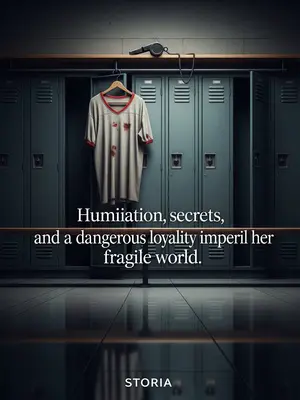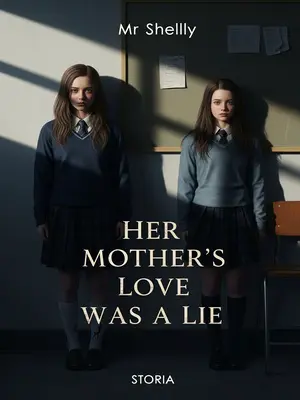Chapter 1: The Teacher in Disguise
When I was in my junior year of college, I met her for the first time. That year, she wore hand-me-down clothes, her eyes always darting, full of panic and uncertainty—she was one of the first students I ever taught. I still remember the way her faded flannel shirt hung off her shoulders, cuffs frayed, a size too big. I swear, those sneakers had seen better days—looked like they'd survived a few too many seasons, soles patched with duct tape. Every time I glanced her way, she'd drop her gaze, clutching her notebook like that notebook was the only thing standing between her and the world. There was something raw and honest in her fear, a kind of vulnerability that made me want to reach out, even if I had no idea how.
The day before I left for my teaching assignment, my hair was still bleached blond, nose ring in, headphones blasting punk so loud I couldn't hear myself think. The academic advisor told me, "The place you’re headed is dirt poor. If you show up as a student teacher looking like this, you’ll embarrass the college."
I remember rolling my eyes so hard I thought they might stick. Slouched in that cracked vinyl chair in the advising office, my battered Converse propped up on the edge of the desk, the Ramones screaming in my ears. The advisor looked at me like I was some stray dog that wandered in. "You can’t go looking like a punk rocker," she said, her voice sharp as a tack. "You’ll freak out the parents, and the principal will call the college before you even finish your first week."
I shot back, "Seriously, who even wants to be a teacher? I’m just here to save American rock music, you know?"
I grinned—half-mocking, half-hoping she'd just let me go. In my head, I pictured myself onstage at some grimy club in Nashville or Seattle, guitar slung low, the crowd roaring. I never wanted to be the person behind a desk, handing out worksheets. But, you know, life has a way of shoving you down roads you never planned on.
The advisor really laid into me. "Then why'd you even come to education school, huh? You still want your degree or not?"
She leaned in, eyes narrowed, her voice going cold. "Look, if you want to throw away three years of tuition, that’s your business. But if you show up at Hill County Elementary looking like Sid Vicious, don’t come crying to me, okay, when they send you packing."
So I went to a cheap Supercuts, got a buzz cut, put on a button-down and jeans, and set off for my internship. First, I took a Greyhound bus—half the seats empty, rain streaking the windows. Then I transferred to a city bus, and after that, climbed into a battered old pickup someone called a "beater." Finally, a ferry across the river.
I can still smell the antiseptic tang of that Supercuts—the stylist clucking her tongue as she sheared off my hair. My nose ring went into a plastic bag in my backpack, tucked between my lesson plans and a stack of CDs. The button-down was borrowed from my roommate—a little too stiff, the collar itching my neck, driving me nuts. The Greyhound was half-empty, the windows streaked with rain, and every transfer seemed to take me further away from the world I knew. By the time I climbed into that rusted pickup, the driver grinned at me through a gap-toothed smile and said, "You must be the new teacher. Don’t worry, it gets better. Trust me."
I left campus at eight in the morning. By the time I arrived, it was already dark. I felt a wave of panic hit me. In front of the crumbling school, a row of kids were waiting. They clapped their hands in rhythm and called out, "Hello, teacher!" A little girl blushed and handed me a bouquet—just wildflowers and dandelions from the fields—nothing fancy, but real.
The air was thick with the scent of grass and earth, and the school’s porch light flickered like it was running on hope alone. The kids’ voices rang out in the dusk, sweet and eager, their faces shining in the half-light. I felt something catch in my chest—a knot of nerves—and, weirdly, something warmer I hadn’t expected. The wildflowers were tied together with a piece of red yarn, petals trembling in the breeze. I knelt down, trying to match their excitement, but my hands were shaking. My heart was pounding.
That was the first time she spoke to me. She bowed her head, barely above a whisper: "Welcome, teacher."
Her voice was barely a whisper, but somehow, it cut right through everything and hit me in the heart. She didn’t look up, just twisted the hem of her shirt in her fists, cheeks flushed. For a moment, I wanted to tell her I was just as scared, but all that came out was a soft, "Thank you."
I was still in shock. The state of the school was even worse than I’d imagined. The main building looked like it could fall down any second. The cafeteria was barely more than a shack, the bathrooms were a nightmare, and I heard there’d be water and power outages at night. I swear, I was cursing out my advisor six ways to Sunday in my head, but I still forced a gentle smile and greeted the kids.
The halls smelled like mildew and old chalk. Linoleum curled at the corners. The cafeteria had a busted screen door and a menu scrawled on a piece of cardboard. Someone had tried to paint over the graffiti in the boys’ bathroom, but the words bled through anyway. That first night, the janitor warned me to keep a flashlight handy—"Power goes out when the wind picks up, just so you know." I wanted to run back to the city, but I smiled and ruffled a boy’s hair, pretending I belonged.
My first time teaching a class, I lost it. No kidding. I totally lost it.
I’d practiced my lesson in front of the mirror, like, a dozen times. Rehearsed every question. Every joke. But standing in front of thirty pairs of eyes, my mouth went dry. My hands shook so badly I nearly dropped the chalk. The clock on the wall ticked louder than my heart—at least, it felt that way.
Sixth grade English and math. Both. After half an hour going over vocabulary, I called a few students up for a spelling quiz. Not one of them could write a single word. I thought I’d prepared well and explained everything clearly, so I figured they just hadn’t been paying attention. I put on my sternest face and asked, "Who’s the class president?"
My voice echoed in the silent classroom, bouncing off the chipped walls. I could almost hear my own heartbeat. A few kids glanced around nervously, but nobody spoke. Finally, in the back row, she raised her hand—hesitant, like she was hoping I wouldn’t notice.
She stood up, slow and terrified.
Her knees knocked as she stood, eyes wide, practically begging me not to call on her. For a second, I almost called her off, but pride kept me quiet. I needed to make a point, or so I thought.
I set the chalk down on the desk. "You—come up and write. Just... write any of the words I just taught, whatever you remember."
My tone was sharper than I meant, and I saw her flinch. Crap, that came out harsher than I meant. She clutched her notebook to her chest and moved like she was wading through mud, every step a struggle. The other kids watched her with the kind of silence that only comes from fear.
She glanced at me, then made her way up front—slow, frozen in place once she got there.
After what felt like forever, she finally wrote a few shaky letters.
Fine, you can’t remember the words. But writing the letters like that? Was she trying to insult my intelligence?
The letters were crooked, barely legible. I felt my face heat up.
Were you even listening? Or are you just slacking off because I’m new?
My voice cracked, harsher than I intended. The words hung in the air, heavy and mean. God, I sounded mean, even to myself. The room was dead silent, every kid staring at their desk. I saw her shoulders shake, her small hands balled into fists at her sides.
She stood next to me, wiping her tears away with her sleeve.
Her face was blotchy, eyes shining with tears she was trying so hard to hide. She kept her head down, but I could hear her sniffling. In that moment, guilt hit me like a punch to the gut. I wanted to reach out, to say I was sorry, but I just stood there, frozen, watching her cry.
The whole class sat in silence. The only sound was her quiet, broken sobs.
I realized then—I was the one who’d failed. Not her, not any of them. Just me. The teacher who was supposed to know better.
